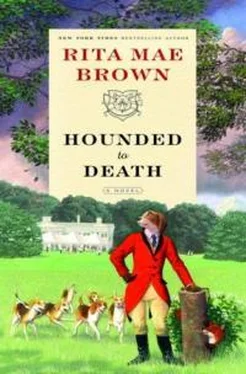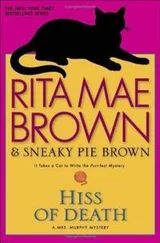Sister opened the hatch of the Forester as hounds neared.
Tootie counted heads. “Giorgio’s missing.”
“Blow again, Shaker. Case he got far ahead.”
Shaker did as his master commanded, but they both knew the stunning unentered hound would not outstrip Dragon, a strike hound. Dragon would have turned on him like a snake. Cora, another strike hound and back in the kennel, would have bumped the younger hound, too. Cora and Dragon had to be used separately. They refused to cooperate with each other, so great was their pride in being first.
Diddy, first one to hop in the SUV, beamed. “Invigorating!”
Soon they were all in the green vehicle, Tootie happy with hounds since they had to flip the back seat down.
Tootie was one of those people who was most herself, most full of life, when with hounds. Her family, suburban people, just couldn’t understand it.
Down at the gate, Tootie wiggled out of the back, and she and Shaker again lifted it off the hinges.
As Sister drove through she wondered if they should have stayed on the hill and blown longer. But she knew Giorgio, inexperienced though he was, would have returned. This country was much more open than her hunting country. At home, a hound might get separated, lost and scared or confused. Occasionally, a youngster would do that. But here, she could see for miles. A tricolor hound is easy to spot.
As Shaker and Tootie climbed back in the SUV, Sister, voice clipped, pronounced, “My hound has been stolen.”
A silence followed. Then Shaker answered, “Yeah.”
“You think . . . ?” Tootie’s voice trailed off.
“Yes, I do,” Shaker, angry, replied. “How can we prove it?”
“He created a distraction. Grabbed Giorgio and let the others out,” said Sister.
“You think?” Tootie was appalled as the two in front nodded their affirmation.
“I will kill that bastard.” Sister meant it, too.
CHAPTER 2
Woodford’s brand-new kennels rested little more than a mile from the Shaker Village entrance. Starting at six in the evening, a yellow flashing light drew human contestants to the party. Tables lined the grassy area outside the kennels, a tent had been set up, and brands of famous Kentucky sipping whiskey lined the bar, as well as some single-cask specials. As Shaker had predicted, there wasn’t a Tennessee bourbon in sight.
Sister allowed herself the pleasure of a wee draft of Blanton’s Single Barrel No. 444, and what a pleasure it was. She needed to settle down. Externally she looked calm, but inside she seethed. Shaker stayed back with the hounds. There was little doubt in either of their minds that Mo had stolen Giorgio.The issue was how to find the hound and, more, how to keep their tempers in check in the meantime. Tootie, sitting next to Sister on a hay bale, watched everything with both interest and suspicion.
“He’s not here at the party,” Tootie commented.
“Mo primps more than a woman.” Sister brushed a paprika-colored ladybug off Tootie’s shoulder. “You’ll have luck since the ladybug chose you.”
Smiling, Tootie replied, “Then we’ll find Giorgio.” She paused. “Maybe Mo didn’t take him. Why would he be so obvious?”
“Arrogant. He figures he won’t get caught. He’s smart enough to hide Giorgio where we can’t find him. Tomorrow, after the show, he’ll pick him up on the way home. I’d bet my life on it.”
“Shouldn’t we tell O.J.?”
Sister shook her head. “She’s on overload. There’s nothing she can do since we can’t prove it. We all know his reputation, but that’s not proof. I’ll tell her after the show. Plus, we don’t want to tip off Mo. If we act as though nothing has happened we just might trip him up.”
“How’d you get so smart?” Tootie admired Sister even as she teased her a bit.
“Foxes. They’ve taught me a lot.”
“Like?”
“To expect the unexpected, for starters.”
“I don’t need to go to Princeton. I need to study foxes.” Tootie dreaded leaving the place and the people she had grown to love, to say nothing of the hounds.
Sister leaned her shoulder on Tootie’s. “Slip away and go over there and listen.”
Sister indicated a large group of younger people—which is to say mid-teens to mid-thirties—clustered around Hope Rogers, who had inadvertently become the center of attention when she brought up the subject of West Nile virus, which can attack both horses and humans.
Tootie walked over to join them. Judge Baker and O.J., immersed in deep conversation, stood at the entrance to the kennels.
A plume of smoke curled up behind an exquisite Maserati. Mo Schneider loved to make an entrance. The machine ensured he’d attract attention. Next to him was his kennelman, Fonz Riley. For the past two years, whenever Mo had participated in a hound show, Fonz drove the rig; Mo drove whatever his latest purchase was. He changed cars like most men change socks. However, when Sister beheld the Maserati she thought he just might hang on to this car a bit longer. She caught herself wondering what a used one would cost. She couldn’t imagine Mo putting Giorgio in the Maserati so she concluded that the hound couldn’t be too far away.
Mo cut the motor, unfolding himself from behind the wheel without turning back to look at Fonz. He zipped straight for the bar, asked for a double vodka straight up, knocked it right back, and held out his glass for a refill. The bartender, a club member, poured another double, and Mo sauntered over to the crowd around Hope.
Fonz, another man who had battled the bottle, picked up a Co-Cola out of the huge cooler and joined other kennelmen.
By now, Hope was urging the young people around her to get involved with the Thoroughbred Retirement Foundation.
Mo listened for all of two minutes, then acidly interrupted, “Some of ’em aren’t worth saving, Hope. That’s what the knacker is for.”
Knacker is an old horseman’s word for the fellow who kills horses. It has been expanded to include the man who takes the horses to the slaughterhouse.
“It’s true some are difficult, Mo, but it’s worth trying to work with them,” Hope responded, even-tempered.
“Bad horse costs as much to feed as a good horse.” He enjoyed needling the good-looking woman.
“Mo, you can afford it,” replied Carl Matacola, a member of Woodford.
Carl, at forty-one, was an associate professor at the University of Kentucky’s College of Health Science. As director of athletic training, he also had a lot of experience in rehabilitation, making him very popular with Woodford’s walking wounded.
The others laughed.
Ignoring them, Mo kept on. “Now that slaughtering horses is outlawed, what happens? People leave them to starve. I say kill them. It’s more humane.”
Those who knew Mo’s reputation smirked when he said humane.
“Only if a horse is crazy—and some are, I agree,” Hope maintained. “Otherwise, give the animal a chance. You’d be crazy too if you’d been stuffed with steroids, fed high-calorie grain, and stuck in a stall for twenty-three hours a day, only going outside to breeze a bit on the track and then be washed down.”
“Oh, attacking the industry now, are you?” Mo stood up to his full height.
Since he was skinny he looked even taller than he was.
“Yes and no. Racing has to clean up after itself, or someone else will do it for us and then everyone loses.”
“She’s right about that,” Jim Fitzgerald said, a stalwart of the Thoroughbred business, who’d walked up and heard the tail end of the discussion. “Anytime folks who aren’t horse people stick their noses into it, everyone suffers, most especially the horses. Kind of like the vegetarians a few years ago who said you could feed your cats high protein and not feed them meat.”
Читать дальше












